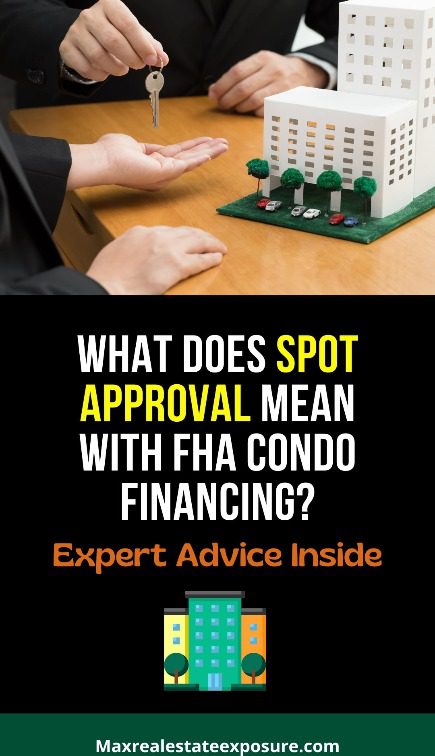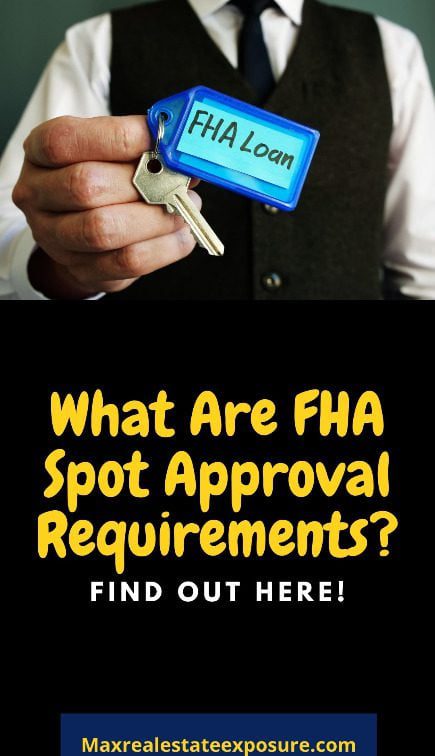What is Spot Approval, and How Does it Work?
 Have you heard of spot loan approvals and wondered what they meant?
Have you heard of spot loan approvals and wondered what they meant?
In the world of real estate, condominiums have gained immense popularity due to their affordability, amenities, and low-maintenance lifestyle. Sometimes obtaining financing for a condo unit can be challenging, especially regarding Federal Housing Administration (FHA) loans.
In the past, FHA spot approvals were a common method for financing individual condo units, but they were suspended in 2009. However, recent developments indicate that FHA spot approvals for condos are making a comeback.
We will explore FHA spot approval and how it impacts potential buyers and sellers.
Understanding FHA Spot Approval
Spot loan approval refers to a process in which the FHA reviews and approves individual condominium units within a larger project.
By getting spot approval, it allows buyers to secure FHA-insured loans. This contrasts with the broader approval process for the condo project, which typically involves a comprehensive evaluation of the entire development.
Before the suspension of spot approvals, homebuyers could obtain FHA financing for a single condo unit, even if the entire project was not FHA-approved.
Having this option benefited buyers purchasing units in smaller, non-FHA-approved condo communities. However, due to concerns about the financial stability of some condo projects during the housing crisis, the FHA suspended spot approvals in 2009.
For years communities had to be on the FHA condo approval list, which negated a buyer’s ability to purchase in some neighborhoods.
The Return of FHA Spot Loan Approval
A renewed interest has recently been in reviving FHA spot approvals to expand homeownership opportunities for potential condo buyers. Recognizing the changing real estate landscape and the need for more flexible financing options, the FHA announced its intention to reintroduce spot approvals in 2019.
Industry professionals and prospective condo buyers alike welcomed this move.
Benefits of FHA Spot Approval for Potential Buyers
The reintroduction of spot loan approvals for condos brings several benefits for potential buyers, enhancing their opportunities to purchase a condominium unit. Here are the key advantages:
Expanded Property Options
FHA spot approvals widen the pool of eligible properties for buyers seeking FHA financing. Previously, buyers were limited to units within FHA-approved condo projects, often excluding smaller or non-FHA-approved developments.
With spot approvals, buyers now have the flexibility to consider units in a broader range of condo communities. This opens up more options in areas with limited FHA-approved projects, allowing buyers to choose from more condos and townhouses that meet their needs and preferences.
Access to Affordable Financing
FHA loans are known for their low down payment requirements and more lenient credit guidelines than conventional loans. With spot loan approvals, potential buyers with difficulty qualifying for traditional financing or saving up for a larger down payment can take advantage of the accessible financing options provided by FHA loans.
An FHA loan is particularly beneficial for first-time homebuyers or individuals with less-than-perfect credit histories looking to enter the real estate market and purchase a condo.
More Competitive Offers
By expanding the availability of FHA financing, spot approvals can increase competition among buyers for condominium units. Sellers in non-FHA-approved projects may experience a surge in demand as more buyers become eligible for FHA loans.
The competition can result in quicker sales and potentially higher prices, as buyers now have more financing options. Consequently, sellers may receive multiple offers and have the opportunity to negotiate more favorable terms.
Lower Down Payment Requirements
One of the significant advantages of FHA loans is their lower down payment requirement. FHA loans typically require a minimum down payment of 3.5% of the purchase price, compared to conventional loans that often demand a higher down payment, typically around 20%.
For potential condo buyers who may have limited savings or need help accumulating a larger down payment, FHA spot approvals provide an attractive financing avenue, enabling them to enter the market with a lower upfront investment.
Easier Qualification Criteria
FHA loans are renowned for their more lenient qualification criteria than conventional loans. When evaluating loan applications, the FHA considers factors such as credit history, debt-to-income ratio, and employment stability.
This flexibility allows potential buyers with more marginal credit or unique financial circumstances to better secure financing for a condo unit. The credit score needed to purchase is lower with FHA loans than with other financing programs.
Spot approvals further facilitate this process by expanding the range of eligible properties. They provide more opportunities for buyers to find a suitable condo that meets their needs and financial situation.
FHA Condo Approval Requirements
 For a condominium project to become FHA-approved, it must meet certain requirements set by the Federal Housing Administration. These requirements ensure that the condo project meets specific standards of financial stability, occupancy rates, and property condition.
For a condominium project to become FHA-approved, it must meet certain requirements set by the Federal Housing Administration. These requirements ensure that the condo project meets specific standards of financial stability, occupancy rates, and property condition.
Let’s take a closer look at the key FHA condo approval requirements. Use this information as an FHA spot approval checklist.
Financial Stability
The condo association must demonstrate financial stability and soundness. This includes providing financial statements and documents that show the project’s budget, reserves, and insurance coverage.
The FHA wants to ensure that the condo association is financially capable of managing the property and addressing any necessary repairs or maintenance.
Owner-Occupancy Ratio
The FHA requires that a certain percentage of the units in the condo project are owner-occupied.
The specific ratio varies, but at least 50% of the units must be occupied by the owners rather than rented out. This requirement ensures that the project maintains a sense of community and reduces the risks associated with investor-owned properties.
Insurance Coverage
The condo community must have adequate hazard and liability insurance. This ensures that the property is protected against potential risks and that the condo association has the necessary coverage to handle liability claims.
Property Condition
The FHA has specific property condition guidelines. The project must be in good overall condition, with no significant structural defects or safety hazards. Additionally, the FHA may require certain repairs or improvements before approval.
Legal Compliance
The condo project must comply with all applicable laws and regulations, including local zoning ordinances and building codes. It should also have proper legal documents, such as a recorded condominium declaration and bylaws.
How Much Does FHA Spot Approval Cost?
You’re probably wondering how much it will cost to get FHA spot condo approval. You can expect the following regarding spot approval costs:
- A condo that has never been approved will cost $850.
- A condo that has expired approval over six months will also cost $850.
- Condos that are not expired but will be up for renewal soon will cost $765.
- An expired condo for less than six months will also cost $765.
- New construction condominiums less than a year old will cost $1500.
How Long Does it Take to Get Spot Approval?
You can expect the time to get spot approval for a condo unit to be around two to four weeks.Click To TweetFHA Condo Approval List
Once a condominium project meets all the FHA condo approval requirements, it will be added to the FHA condo approval list. This list includes all the projects that have received FHA approval, allowing potential buyers to identify which projects are eligible for FHA financing.
Buyers can consult this list to ensure the condo they want is FHA-approved.
It’s essential to note that while being on the FHA condo approval list is beneficial, it does not guarantee financing for an individual unit within the project. Buyers should still work with a lender knowledgeable about FHA condo financing to ensure their desired unit qualifies for FHA financing.
In conclusion, the FHA condo approval requirements establish standards for financial stability, occupancy rates, property condition, and legal compliance. Meeting these requirements includes a condo project on the FHA approval list.
Impact on Condo Sellers
The reintroduction of FHA condo approvals also benefits condo sellers. With more buyers able to secure FHA financing, sellers in non-FHA-approved projects may experience increased demand and a larger pool of potential buyers. This can lead to quicker sales and potentially higher prices, as buyers have more financing options.
However, it’s important to note that the return of spot approvals still needs to eliminate the need for broader project approvals. Lenders may still require the entire condo project to be FHA-approved to ensure the overall financial stability of the development.
Therefore, sellers should still consider obtaining project-level approval to attract a wider range of buyers. One of the reasons sellers don’t like FHA loans is because of all the requirements. Having spot approvals is one less thing to worry about.
Final Thoughts on Spot Loan Approvals
The return of FHA spot approvals for condominiums is a positive development for buyers and sellers in the real estate market. It expands financing options for buyers, particularly in non-FHA-approved projects. Subsequently, it offers sellers access to a more significant pool of potential buyers.
The reintroduction of spot approvals reflects the FHA’s commitment to promoting homeownership and making affordable financing available to a wider range of individuals. As the real estate market evolves, these changes contribute to a more inclusive and accessible condo market, benefiting buyers and sellers alike.
As a real estate agent for the past thirty-seven years, in my experience, it is good to see this change.
About the author: Bill Gassett, a nationally recognized leader in his field, provided the above Real Estate information on what FHA spot approval is and how it works. Bill can be reached via email at billgassett@remaxexec.com or by phone at 508-625-0191. Bill has helped people move in and out of Metrowest towns for the last 37+ Years.
Are you thinking of selling your home? I am passionate about Real Estate and love sharing my marketing expertise!
I service Real Estate sales in the following Metrowest MA towns: Ashland, Bellingham, Douglas, Framingham, Franklin, Grafton, Holliston, Hopkinton, Hopedale, Medway, Mendon, Milford, Millbury, Millville, Natick, Northborough, Northbridge, Shrewsbury, Southborough, Sutton, Wayland, Westborough, Whitinsville, Worcester, Upton, and Uxbridge MA.

